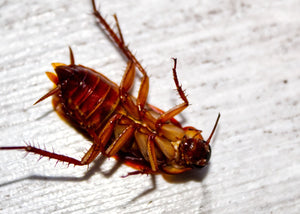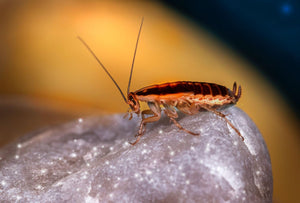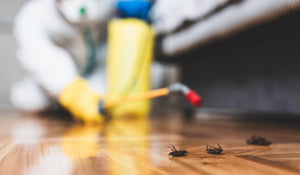
Waking up with a few itchy bite marks is never a pleasant feeling, and you might be thinking a mosquito or a bed bug got to you, but what if it was a cockroach? Although it’s rare, roaches can and will bite anything and anyone if they are hungry.
We’ll discover if cockroaches bite humans and pets, and what are the symptoms and treatments for cockroach bites. So, stay tuned to find the most efficient ways to deal with roach infestations and get rid of the pests for good.

Do Cockroaches Bite Humans?
Yes, cockroaches bite humans but on rare occasions.
Roaches are omnivores meaning they will eat anything to survive, including plants, meat, and even other roaches. They are one of the most resilient pests in the United States and they have been here many years before modern humans so they evolved to be very flexible when it comes to food sources.
While roaches prefer food remains and don’t have a particularly strong mouthpiece they can bite humans if they are desperate and hungry enough.
Although there are just a few recorded cockroach bites in history there have been several suspected cases when the infestation in the home is so severe the food is scarce and roaches try anything to survive. The most famous cases were recorded in some hospitals where the patients had open wounds and even on some ships a long time ago, where roaches were considered a threat.
There are even some cases that claim roaches feed on food residue babies have around their mouths because they eat during the night. While the roaches are not biting humans and babies it’s not a pleasant site and it’s a health risk for many.
Keep in mind that roaches are nocturnal eaters, so if you notice itchy bites and red marks in the morning it can be from bed bugs but also roaches.
Do Cockroaches Bite or Sting?
Roaches have a mouthpiece and bite their prey with it.
Most of the roaches we know, such as German roach, American roach or Oriental roach don’t sting but rather bite their food. However, even if the roach tries to bite you, their mouthpieces are not strong enough to penetrate the skin but can still cause rash and swelling.
It’s also not comforting to know that roaches carry a lot of pathogens, and some people are allergic to proteins in roach saliva. So, roach bites are not just annoying and itchy but can cause allergic reactions and secondary infections.

Do Cockroach Bites Itch?
Cockroaches bite certain areas such as the mouth, hands, fingers, or face. This is simply because there is food residue there and roaches are roaming for their next meal. So, if you have an itchy bite in those areas you might be facing a severe roach infestation.
The roaches might be opportunistic. but they much prefer soft foods and rarely bite humans. Roach bites can indicate an infestation and you should consider consulting professionals.
When roaches bite. you won’t feel it like you would with other insects such as bees or mosquitoes, and considering they do it during the night, you will probably feel the itchy consequences in the morning.
One thing is for sure: don't scratch the itchy bite because you will make things worse. We will mention all the roach bite treatments later so keep on reading.
Cockroach Bite Symptoms
Many people confuse the itchy bites cockroaches make with different insects, and most often suspect they might have a bed bug infestation. But, cockroach bite symptoms can be more dramatic and many people face severe allergic reactions.
The cockroach bite mark will be bright red, swollen, and very itchy. While you might not feel the bite during the night, you will wake up with marks on specific parts of your body.
Roach bite marks are not commonly seen because they will eat anything in your home and don’t really depend on human blood like bed bugs, but they can cause severe allergic reactions. These can include additional swelling, body rash, heavy breathing, and asthma attacks.
This is one of the reasons so many people invest in high-quality roach traps as soon as they notice a few bugs in their homes. This is the best way to eliminate pests early and avoid potential problems.
Cockroach Bite Treatment
If you are wondering about cockroach bite treatment at home you are in luck, because the procedure is quite simple. Here are the steps you need to follow if you wake up with swollen roach bite marks on your body. Even if it turns out the bites are not from roaches this approach is completely safe and will help with any bites.
Clean the bite
Use antibacterial soap and water to thoroughly wash the place where the roach bit you. This should eliminate most of the germs and bacteria reducing the chances of infection.
You can also use alcohol but plain water and soap will do the trick, considering the alcohol may dry it out more and cause a tightening and itching sensation.
Apply cold compress
Once you disinfect the area you should apply some ice packs or cold compresses to reduce the swelling and inflammation. The cold will help with itchy skin and lower your chances of a severe reaction to the roach bite.
Wait it out
Cockroach bites are not poisonous so if you don’t have an allergic reaction you simply need a couple of days to heal.
Keep in mind that it’s always a good idea to consult with your doctor and immediately hire experts to get rid of pest infestation in your home.

How to Get Rid of Cockroaches?
Now that we are familiar with the roach bite symptoms and you know how to treat the itchy skin at home you might be wondering how to prevent the same thing from happening again. As mentioned before roaches biting you can mean a severe infestation and lack of food, so you should react quickly.
There are many roach pesticides on the market but they often cause more harm than good, so you should opt for eco-friendly and efficient solutions.
Here are a couple of suggestions to manage and eliminate roaches from your home:
Clean the clutter
Cockroaches need hiding places and humidity to thrive in addition to food and water sources. So, if you want to ensure roaches are kept far away from your home you should make it less attractive to pests.
This can include:
- Clearing up the clutter in the attic, basement, kitchen, and garden
- Repairing leaking pipes and entry points to your house
- Keeping food in airtight containers
Set up roach traps
One of the best and most efficient ways to manage, reduce the number, and eliminate cockroaches from your home is to use traps. The most common and easiest to use are the glue traps that have strong adhesive and lure the roaches into the trap.
It’s a good idea to set up multiple traps around your home and in places where roaches like to hang out. This will help you determine the severity of the infestation and even help you assess the effectiveness of other tools and products you might be using.

Dust Diatomaceous Earth (DE) powder
Once you set up the traps and confirm the infestation you should add the diatomaceous earth powder to all the hiding places. This natural powder will dry out the exoskeleton of roaches and all other pests you might have in your home such as bed bugs or silverfish, so you will kill many insects at once.
Diatomaceous Earth is a fine powder so it’s a good idea to use specialized powder dusters with long nozzles for precise application in remote areas.
Call Exterminators
If you do all the previous steps we mentioned and you still have a lot of bugs in your traps, it’s a good idea to contact professionals in your area.
Roaches are resilient and persistent so you might need some help dealing with a severe infestation. Professional teams have all the equipment and tools to help you get rid of pests in no time.
Final Thoughts
Cockroaches are one of the most common pests in United State homes, but luckily they rarely bite humans or animals. Roach bites are not very well documented and they often get confused with bite marks from other insects.
Nevertheless, roaches can and will bite if they are desperate for food and there are many living in your home. While it’s not a particularly dangerous bite if you are not allergic it’s a good sign that you need to react immediately and stop the infestation from spreading.
Cockroach bite is easily treatable with soap, water, and cold compress but if you do have a severe allergic reaction you should visit your doctor. In addition, start your fight against the bugs in your home right away and set up all the traps mentioned above.








